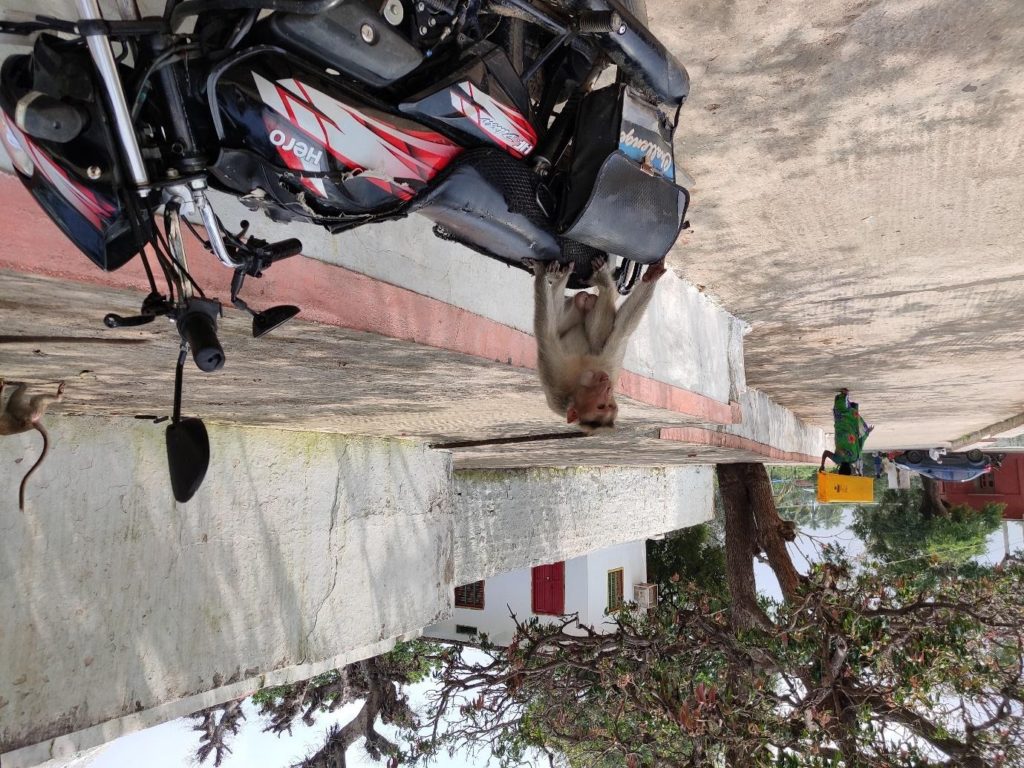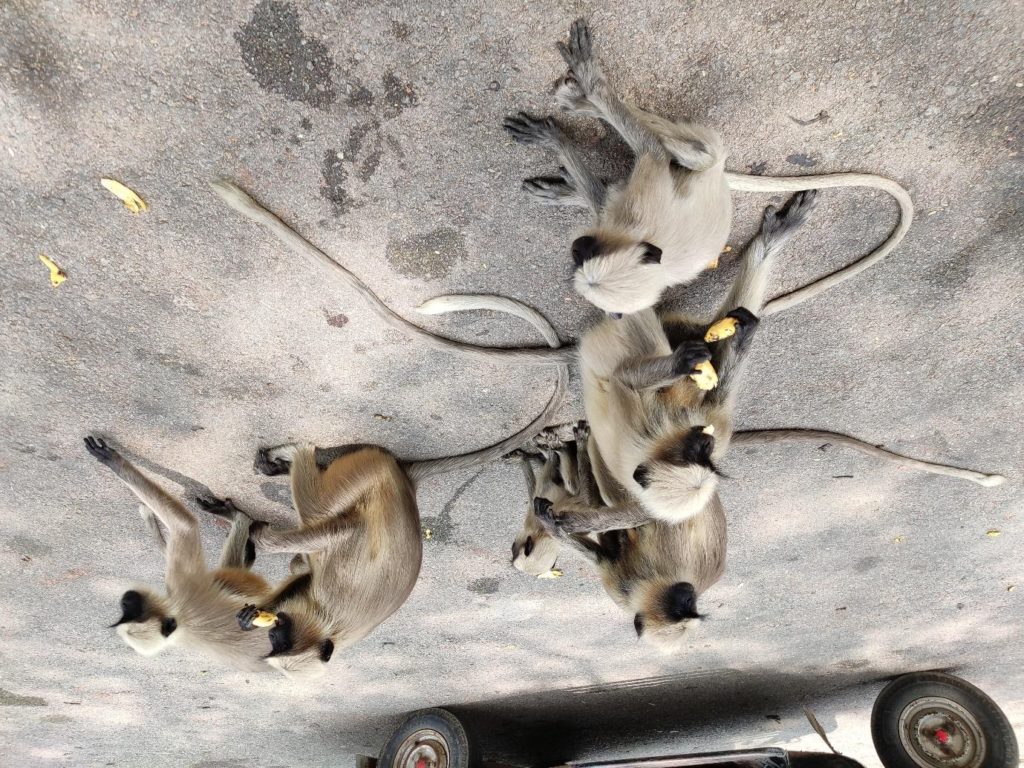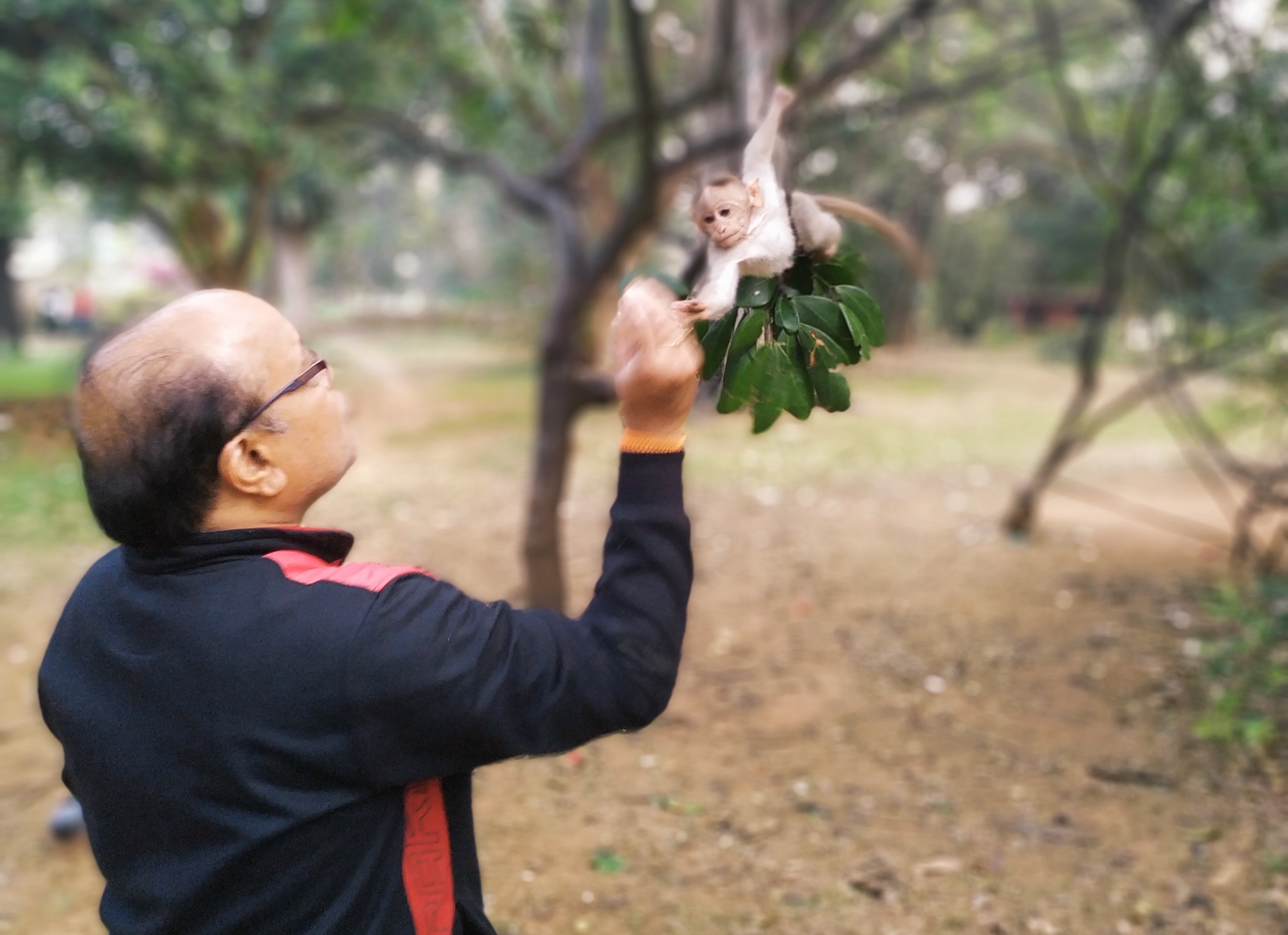Meera Bhardwaj:
Even as the monkey population is multiplying across the country from the north to the south and west to east in India, people have taken to feeding this species as they are not only associated with Lord Hanuman but since ancient times, they have charmed, begged or attacked people to fill their bellies. Calling for educational campaigns and awareness among citizens, wildlife organizations and activists appeal to people not to feed monkeys as it leads to man-animal conflict and also diminishes the natural instincts of these primates to survive in the wild.
With their beguiling eyes and swift movements, the Rhesus Macaques can be commonly spotted swinging from one branch to another in the wild, surrounded by their troop. However, when they are driven out of their natural habitat and enter urban spaces, they are spotted jumping from one building to another very easily.
Photo Credit: Wildlife SOS: Highly Adaptable Rhesus Macaques are found across Asia
Many times, they can be seen breaking into houses in hunger and exhaustion and becoming victims of vilification by humans. This is a very common in Delhi, Jaipur, Ahmedabad, etc. Day in and day out, monkey catchers are called by people to remove them from their neighborhood. Now according to prevailing religious beliefs in India, the Rhesus Macaque is associated with Hanuman and so, many desist from harming the animal. However, despite the religious protection, the macaques still find themselves in an increasingly disadvantageous position.

According to a study paper on human-monkey conflicts and its associated problems in Assam by Prabhat Kumar Rai, Mizoram University, Pallab Deb and P C Bhattacharjee, the Rhesus macaque is widely distributed throughout North and Northeast India. They are aggressive and cause damage to human property while harassment is pretty common. It was found that the total number of Rhesus macaque population was 330 within Badarpurghat, the study area and they were distributed in six separate troops.
LARGE-SCALE HABITAT DESTRUCTION
Researchers further found in this area a total of 35 cases of monkey bite. And 76 cases of aggressive threats too were reported with physical attacks in the form of scratching by nails and biting by their teeth. The reason for this behaviour being: the continuing large-scale habitat destruction throughout the entire home range of this species. The scientists deduced this was the main cause for the rising man-monkey conflict in the study area.
Extreme poverty has also forced the poor people to damage forest for their immediate survival and this has led to rising man-monkey conflicts due to destruction of forests and their natural habitat. Further, improper disposal of food wastes had accelerated the conflict, researchers concluded. Recently, conflict has increased alarmingly and in the absence of an appropriate management plan, this problem is only going to get worse in the future.
MONKEY-HUMAN INTERACTION
Apart from this, the increasing interaction between humans and monkeys does not bode well for this species which is why when you see a monkey, kindly refrain from feeding them for all the right reasons.
Even if one is a big animal lover, when you feed wild animals, you risk their lives and increase their co-dependency on humans, thereby, diminishing their natural survival instincts.
By law, it is a punishable offence to feed a wild animal which is why when you feed a monkey (for any reason whatsoever!), you are directly inviting a hefty fine and risking the life of an animal.
WHY SHOULD MONKEYS NOT BE FED?

- Monkeys play an important role in maintaining healthy forest ecosystems. They help in the process of seed dispersal as their diet is mainly fruits.
- When habituated, feeding leads them out of their natural habitat which adversely affects the health of the forests and alters their foraging patterns.
- By feeding monkeys, you lure them out of their natural habitat into the cities. This directly increases their chances of becoming victims of roadkill by speeding vehicles on roads and highways.
- Injured monkeys are banished from their troops and most of the time, they do not receive proper medical care. They end up with permanent injuries and disabilities, making survival difficult.
- Dead mothers leave behind orphaned baby monkeys that are barely a few weeks old which are incapable of surviving on their own.
- Orphaned monkeys either end up getting attacked by other animals or fall prey to ruthless accidents.
WHAT HAPPENS TO MONKEYS IN URBAN SPACES?
THE BEHAVIOURAL CHANGES:
- In urban spaces, Monkeys can be spotted swinging from high voltage cables to another, which is life-threatening for them. A minor shock can cause severe burn injuries, paralyze their entire body and even kill them!
- There will be rise in monkey attacks on humans when food is refused which leads to monkeys being villainized by the local resident communities.
Photo Credit: Wildlife SOS: Langurs are Poached to drive away monkeys from Cities
- In view of the rivalry between Gray Langurs and Rhesus Macaques, poachers capture the former so that they can be used to chase away Rhesus macaques. However, Gray Langur has protection under the law and it is a punishable offence to exploit them for any commercial purpose.
- Once driven out of their natural habitat, monkeys are often abused by madariwalas for entertainment purposes and one can spot them dancing on the town and city streets, tethered at the end of a two-foot-long rope. They are forced to perform tricks while wearing jazzy costumes and make-up.
Photo credit: Wildlife SOS: Monkeys are Reduced to mere roadside Entertainment
- Interaction between humans and monkeys also increases the risk of disease transmission from one to another. This puts humans at serious risk while decreasing the monkey’s population in the wild.
Meanwhile, Wildlife SOS Rapid Response Unit, operating out of Agra and National Capital Region of Delhi states that they receive regular distress calls pertaining to injured monkeys that are attacked by stray dogs, humans, or brutally electrocuted. They add, “Our animal care staff has also attended to orphaned baby monkeys which cling to their deceased mother’s bodies in fear and starvation and require lifetime care.”

